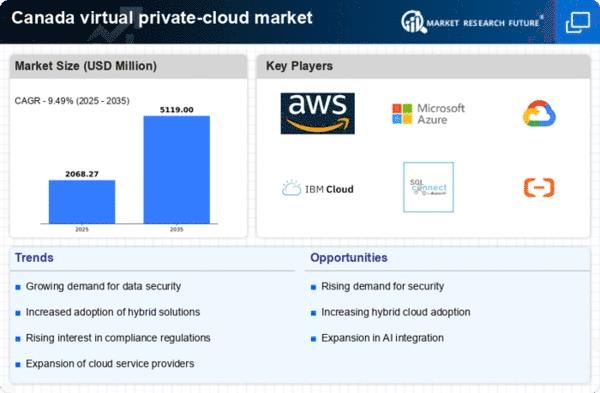Rising Demand for Data Sovereignty
the virtual private-cloud market in Canada experiences a notable surge in demand for data sovereignty.. Organizations are increasingly concerned about where their data is stored and processed, leading to a preference for local cloud solutions. This trend is driven by regulatory requirements and the desire to comply with Canadian privacy laws, such as the Personal Information Protection and Electronic Documents Act (PIPEDA). As a result, businesses are gravitating towards virtual private-cloud services that ensure data remains within Canadian borders. This shift is expected to contribute to a projected growth rate of approximately 15% in the virtual private-cloud market over the next five years, as companies prioritize compliance and security in their cloud strategies.
Shift Towards Remote Work Solutions
the virtual private-cloud market in Canada is witnessing a shift towards remote work solutions., which has become increasingly relevant in the current business environment. Organizations are adopting virtual private-cloud services to facilitate remote access to applications and data, ensuring business continuity and operational efficiency. This trend is supported by the need for secure and reliable access to resources from various locations. As a result, the virtual private-cloud market is projected to grow by approximately 20% in the coming years, driven by the increasing reliance on remote work arrangements. Companies are recognizing the importance of robust cloud solutions to support their workforce, leading to a heightened demand for virtual private-cloud offerings.
Emergence of Advanced Security Features
The emergence of advanced security features is a pivotal driver for the virtual private-cloud market in Canada. As cyber threats become more sophisticated, businesses are prioritizing security in their cloud strategies. Virtual private-cloud providers are responding by integrating cutting-edge security measures, such as encryption, multi-factor authentication, and intrusion detection systems. This focus on security is crucial for organizations that handle sensitive data and must comply with stringent regulations. the virtual private-cloud market is likely to benefit from this trend., as companies seek solutions that offer enhanced protection against data breaches and cyberattacks. The integration of advanced security features is expected to attract more clients, further propelling market growth.
Growing Need for Scalability and Flexibility
The growing need for scalability and flexibility is a significant driver for the virtual private-cloud market in Canada. Businesses are increasingly seeking cloud solutions that can adapt to their changing needs, allowing them to scale resources up or down as required. This demand is particularly evident among small and medium-sized enterprises (SMEs) that require cost-effective solutions without compromising performance. the virtual private-cloud market is poised for growth., with estimates suggesting an increase of around 18% in adoption rates among SMEs over the next few years. This trend indicates a shift towards more agile cloud environments, where organizations can respond swiftly to market changes and operational demands.
Increased Investment in Cloud Infrastructure
Investment in cloud infrastructure is a critical driver for the virtual private-cloud market in Canada. Companies are allocating substantial budgets to enhance their IT capabilities, with a focus on scalable and flexible cloud solutions. According to recent data, Canadian enterprises are expected to invest over $10 billion in cloud technologies by 2026, with a significant portion directed towards virtual private-cloud services. This influx of capital is likely to foster innovation and improve service offerings, making virtual private-cloud solutions more attractive to businesses seeking to optimize their operations. The competitive landscape is evolving, as providers enhance their infrastructure to meet the growing demand for reliable and efficient cloud services.
















